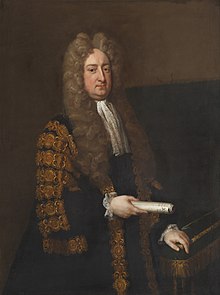William Bromley (speaker)
|
The Right Honourable Sir William Bromley |
|
|---|---|
 |
|
| Speaker of the House of Commons of Great Britain | |
|
In office 1710–1713 |
|
| Preceded by | Richard Onslow |
| Succeeded by | Sir Thomas Hanmer |
| Secretary of State for the Northern Department | |
|
In office 17 August 1713 – September 1714 |
|
| Preceded by | The Viscount Bolingbroke |
| Succeeded by | The Viscount Townshend |
Sir William Bromley (1663 – 13 February 1732) was an English Tory politician. He was Speaker of the House of Commons of Great Britain from 1710 to 1713 and Secretary of State for the Northern Department from 1713 to 1714.
Bromley was a member of an old Staffordshire family, which by the time of his birth was settled in Warwickshire. He was the son of Sir William Bromley (died 1682) and his wife Ursula (a daughter of Thomas Leigh, 1st Baron Leigh of Stoneleigh, Warwickshire). He was born at the family seat at Baginton, Warwickshire, and was baptized on 31 August 1663.
In 1679 Bromley entered Christ Church, a college of the University of Oxford, and received a Bachelor of Arts degree in 1681.
Bromley missed the Glorious Revolution because he was travelling in France and Italy, following the death of his first wife in 1688 (he eventually married four times). Upon his return to England he embarked on a political career. Throughout his time in public life Bromley was a staunch high church Tory with a reputation for honesty and extreme partisanship. His political rivals sometimes found it useful to allege Jacobite sympathies and to refer to Bromley's travel memoirs Remarks on the Grand Tour of France and Italy to support that allegation.
In 1690 Bromley was elected to represent the county constituency of Warwickshire in the House of Commons of England. An able debater, his reputation rose rapidly; particularly amongst the Tory squires who shared similar prejudices. In 1696 Bromley refused to take an oath to swear that William III was the rightful and lawful King. As a result, he was incapacitated from serving in Parliament and was not re-elected for Warwickshire in 1698.
...
Wikipedia
